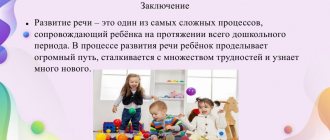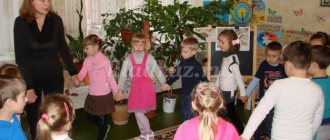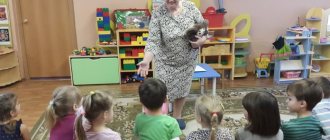Pronunciation of complex sounds
Articulation develops gradually; children usually master the pronunciation of complex sounds last. Often in speech the child replaces them with simpler ones or does not pronounce them at all.
Sound "R"
Experts advise studying this difficult sound in a child at the age of 5. If the baby pronounces “r”, but incorrectly, then even earlier - then it’s more difficult to relearn.
To help:
- Tongue twisters with “r” (“Karl stole corals from Clara, and Clara stole Karl’s clarinet.”
- Imitation (just say “r” in your speech in front of the child as clearly and cleanly as possible).
- Production from other sounds that the child pronounces correctly. For example, when a child pronounces “zh”, carefully move the tongue deeper into the mouth with a stick - a “r” is formed. Strengthen the sound by repeating the exercise several times. Or the baby says “z”, lightly touching the alveoli with his tongue, and blows heavily on the tongue. The sound "r" is heard.
- Three-stage exercise: the tongue is “sucked” to the hard palate, the child takes a deep breath through the nose and a short exhale through the mouth, connecting the voice.
- Setting up mechanically (carried out only by a speech therapist - with a hammer, spatula).
Sound "Sh"
The production of this sound occurs at 3–5 years of age.
The most commonly used way is through “s”. The child raises his tongue to the sky, pronounces “s” and smoothly exhales air to make “sh”. Before directly placing the “w,” experts recommend developing articulation of the lips and tongue with the help of exercises:
- A wide smile, exposing both rows of teeth, for 5-7 seconds.
- Licking lips with a “wide tongue” from top to bottom.
- Curling the wide tip of the tongue towards the nose.
- The child stretches out his lips with a straw and blows on a cotton ball for a long time, pushing it, for example, into the corner of the table.
- The baby blows through his closed lips onto a strip of paper - stronger, weaker, stronger again.
Development of a child's grammatical abilities
These games help develop children's grammatical abilities without cramming the letters of the alphabet, without the dull reading of syllables from a book.
"Let's remember the letters." Goal: to help the child remember the letters of the alphabet, relying on auditory, visual, and muscle memory.
* An adult traces the letter along the outline, naming it, and the child shades the letter with a pencil or paints it over.
* The adult draws the outlines of the intended letter in the air, the child tries to guess and name it. In a similar way, an adult draws a letter on the child’s back.
* The letter is molded from plasticine, constructed from matches, counting sticks, and seeds.
* An adult and a child take turns naming the similarity of a letter with objects from the surrounding world.
"Hide and seek with letters." Goal: to train intelligence, imagination, and the ability to recognize familiar letters in graphic contours.
A simple pattern is drawn on a sheet of paper, on sand, on asphalt. You need to look closely at it, see the outlines of letters in its lines and show them in the pattern along the contour one by one.
How do you know when it’s time to work on your child’s speech?
Initially, the child learns to pronounce sounds, then to put them into words, then to construct phrases and express thoughts. You should not expect from a two-year-old child impeccably clean pronunciation and beautiful speech, observing genders and cases. In addition, until the age of three, a child will not be able to concentrate on classes for more than 10 minutes.
The optimal age for starting classes for a healthy child is four to five years. By six he should already be able to pronounce sounds correctly and express his thoughts coherently. It is better to correct the pronunciation before the molars grow in.
Classes are needed if:
- the baby pronounces individual sounds incorrectly;
- the child rearranges syllables in words, constructs phrases incorrectly, confuses cases, gender, and numbers;
- “porridge in the mouth”;
- speech is too fast, slurred;
- the child stutters;
- the baby has suffered a birth injury or infectious disease;
- The child was diagnosed with hearing impairment, mild mental retardation, and developmental delay.
Even if you are not going to take your child to a speech therapist on an ongoing basis, it is worth bringing him for a consultation - you will receive recommendations for home activities. It is also advised to show the child to a speech therapist before school, even if there are no obvious problems.
The problem of speech disorders is not always purely speech therapy - sometimes it makes sense to correct pronunciation only after treatment.
Fun ABC lesson
This group of games helps children learn a lot of new things from the life of words, expand their vocabulary, and knowledge about language.
Ball game "Say the opposite."
Winter summer. Heat - cold. True False. Rich man - poor man. Bitter - sweet. Useful - harmful...
"The Magic Wand of the Fairy Slovarina"
To play you need a “magic” wand. One end of the stick decreases, and the other increases.
An adult player names a word, then touches one of the children with a stick. The child calls this word either diminutive or increasing, depending on the end of the stick with which the child was touched.
House - house - house. Bridge - bridge - bridge. Rain - rain - rain. Cat - cat - cat...
Author: Krugovykh Margarita Aleksandrovna
Senior teacher of MADOU d/s No. 7 in Ishim
Everyone knows what an important function breathing performs in the life of the human body. In addition to its main physiological function - gas exchange - breathing also provides such a function as speech breathing. Speech breathing (diaphragmatic) is the basis of sounding speech, the source of the formation of sounds and voices.
The mechanism of this type of breathing is inherent in us from the very beginning. This is the oldest type of breathing, inherent in all warm-blooded animals and 90% of the total need for breathing is carried out due to it.
The main muscle that powers this type of breathing is the diaphragm . It separates the abdominal and thoracic cavities. When you inhale, the diaphragm relaxes and, falling, presses on the abdominal organs, which in turn are pressed against the abdominal wall, causing it to protrude and round. As you exhale, the diaphragm contracts, compresses the lungs, and the abdominal wall retracts. In this case, the upper part of the chest remains motionless. Outwardly, it looks like belly breathing.
When correcting speech disorders, there is a need to specially organize and develop speech breathing; breathing exercises become of particular importance. The corresponding gymnastics is aimed at developing in children the skills of correct rational breathing and voluntary control of the process of air flow movement.
How to create an activity at home?
The main principles of homework:
- Regularity. Exercise every day, but without overloading the baby and taking into account his age and well-being. You can start with 3-5 minutes a day, gradually increasing to 15-25.
- Game form. Only you know what your child will like most: retelling an interesting story or a competition to see who can pronounce a tongue twister the fastest. Start with tasks that are more interesting to your baby, gradually moving on to less exciting ones.
- Comfortable environment. For many types of activities you need, at a minimum, a table, a comfortable chair, and often a mirror on a stand.
- Patience. It is impossible to achieve amazing results in one mini-lesson. Encourage your child, praise him for successes and don’t get angry for mistakes, don’t laugh or imitate. Otherwise, the baby will withdraw into himself, and speech problems may worsen.
- Do not do tasks for your child if he cannot cope with them. The point of the classes is to benefit the baby, and not to impress the speech therapist.
Speech development: how to and how not to develop speech in preschoolers
Part 1. Why do you need to develop speech and what is speech development? Or we determine the goal of speech development and “hit the bull’s eye”
Speech development: typical mistakes in understanding the goal.
To do anything effectively, we need to have a very precise idea of the desired goal of our actions. Then we will be able to “hit the bull’s eye” and achieve it. What will happen as a result of our actions? What will the child or his speech be like?
If there is no precise understanding of the goal, then our actions will be very similar to shooting sparrows from cannons, and the goal will be difficult and almost impossible to achieve. The selection of ways to achieve it, that is, the selection of effective speech development techniques and the ability to distinguish them from ineffective ones, also depends on understanding the goal.
Therefore, at the beginning, let's look at the purpose of developing the speech of children in preschool age and the typical mistakes that are encountered in this very important issue.
What is speech development? Opinion 1 and error 1.
The most common mistake in speech development, which I encounter every day in my practice of communicating with parents and teachers, with my friends, is understanding speech development too narrowly - as the work of a speech therapist to identify impaired sounds in children. It is believed that if a child pronounces all sounds, then his speech is well developed and there is no need to develop anything, which is not at all true! Once I even heard from the teacher’s lips (I went with a friend to pick up her child in kindergarten and accidentally heard the teacher’s remark): “You know! It turns out that we also need to develop children’s speech, but we are not a speech therapy group.” This was said by the teacher of the senior group of a kindergarten in a large city (!!!), which showed me that even many teachers do not understand the purpose of their own work on the development of children’s speech and do not know why it is necessary. This means they have no results in this direction.
Let's separate these two concepts and these two lines - speech correction and speech development.
Line 1. Speech correction.
A speech therapist deals with speech correction, i.e. correction of speech disorders in children and adults. That is, a speech therapist conducts classes with children whose speech is already impaired and helps the child correct speech disorders. Moreover, speech disorders concern not only sounds, but also speech breathing, intonation, tempo and timbre of speech, as well as grammar, vocabulary, coherent speech, that is, all aspects of speech development. If a child does not have speech disorders, then he does not need speech therapy classes, but he does need speech development classes (see line 2).
Speech therapists conduct classes with the youngest children of early age with delayed speech development or mental retardation, as well as with older children - 3-7 years old, and even with schoolchildren, teenagers and adults. But the methods of teaching 2-year-olds and 5-year-olds or schoolchildren are different.
Line 2. Speech development and prevention of speech disorders.
With normal speech development, the child does not require speech therapy classes. But developing his speech is very necessary and important! This means that he needs classes and games not for speech correction, but for speech development. A lot can be done from the first days of a baby’s life to prevent him from developing speech disorders in the future. And so that he speaks freely, beautifully, accurately, expressively, correctly and without mistakes. This is the development of speech.
I specifically wrote it in simple everyday language without terms, so that the difference would be clear.
What is “speech development”? Opinion 2 and error 2.
Very often, the concept of “speech development” is narrowed in modern families, and in many centers of preparation for school and preschool education, only to prepare children for learning to read and write, or is considered even more narrowly - only as learning to read. That is, in this case, teachers and parents believe that the development of speech in preschoolers is teaching children to read and children’s good knowledge of letters. But quick reading and knowledge of such concepts as “word”, “syllable”, “hard consonant”, “soft consonant”, “vowel”, “sentence” is only a small, very narrow part of the holistic system of speech development in preschool age. And it cannot be “torn out” from this system. More on this below.
A case from my practice. Many years ago I held a parent meeting for my new group of kids. The children in my group at that time were three years old, some were four. The first thing parents asked me at the meeting was how quickly I could teach their children to read, and at what speed they would read by the end of the school year. They thought that since I was working on speech development, this meant that the main thing for me in teaching three-year-old children was reading. Then I asked one of the mothers: “Irina, when you got your prestigious job, did you go through a competitive interview?” “Of course,” Anechka’s mother answered. “Did you have your reading speed checked when applying for this job?” Anya’s mother laughed: “Of course not.” Then I asked those mothers and fathers who had their reading speed tested when applying for a job to raise their hands. Haven't checked with anyone :). I asked what was being tested, and what tests did they need to pass? It turned out that absolutely everyone, when applying for a job, was tested for their ability to navigate new situations, as well as in typical and non-standard situations, think independently, prove their opinion correctly, conduct a discussion, analyze information, not get lost in life situations, general level of development, ability cooperate with people and other life skills. “This is what is laid down in preschool childhood, and this is what I will teach your children,” I said then. – “And have your own thoughts, and express them accurately and clearly for your interlocutor, conduct a discussion, clearly formulate questions and answers to them, defend your opinion, navigate different life situations of verbal communication. And this is the development of speech in babies!” So what will be the most important thing in children’s lives – reading speed or these vital skills of verbal communication with people, the ability to express oneself, one’s thoughts and feelings, to feel one’s individuality? Every parent answers this question for himself. (Note: I do not deny reading, but I believe that it should not be an end in itself and the most important thing in teaching children)
At this meeting we resolved this issue in favor of vital communication skills. And we did it brilliantly! These children not only spoke well by the end of preschool age, they became my co-authors of many speech games and activities that you are now reading on the site. And we also wrote two very real books, published by the Karapuz publishing house in the series “Development of Speech and Verbal Communication” on interesting expressions of the Russian language (counting crows, scratching with your tongue, and others). Games with these children and the stories and tasks they invented formed the basis of my online course “Topsy-Turvy: Topsy-Turvy Speech Problems for the Development of Children’s Thinking, Creativity and Speech.”
What is “speech development”? Opinion 3 and error 3.
Another very common mistake that I encounter in letters from readers of the site is equating the development of speech with its appearance in a child. From this point of view, it turns out like this: as soon as the baby speaks, as soon as his first words appear, there is nothing left to develop, no development of speech is needed, because the child speaks, which means speech is there and developed! This is wrong. The first words are just the first stage in speech development. All the most interesting things await you ahead. And writing fairy tales and riddles, and getting to know poetry and other genres of children's literature and the ability to distinguish them from each other, and logical speech problems, and games with sounds, syllables, sentences, and retellings, and much more.
What is speech development? Opinion 4 and error 4.
Some people believe that the method of speech development is simply tongue twisters, counting rhymes, riddles, and simple proverbs. You need to use them with children in any order and more often, and everything will be fine.
Or there is an opinion that speech development is simply a child’s memorization and naming of different objects from pictures (memorizing and naming the names of cities, trees, flowers, animals, countries, body parts, birds, fish, etc.). And we need to make sure that the baby remembers more words - the names of objects, so his speech will be developed. This is wrong. Developed speech is much more than simply naming objects.
I encounter this error all the time on different sites on the Internet. For example, on one of the sites for mothers, the author wrote that for early childhood there is a developed method for speech development, everything is clear, there are well-planned Doman classes, but “for preschool age there is no method for speech development, it needs to be created.” This phrase brought a sincere smile to my face, and I laughed heartily and for a long time. After all, entire teams of talented scientists and practitioners for many decades in our country have created and are creating methods for the development of speech in children! Students learn this technique for several semesters, and it is considered one of the most difficult. And the method of speech development is not a mountain of chaotically selected rhymes, poems or tongue twisters and games - but these are specific stages of solving specific problems in their system. Well-founded, proven steps! Since each pure tongue twister or tongue twister or other technique does not exist on its own, but “fits” into the system of speech development, and fits not just like that, but into a specific direction and at a specific stage of children’s education. It is then that they will really “work” most effectively on the development of children’s speech. Otherwise, we use only 10-20% of their potential.
What happens when this error occurs? We get the so-called “learned helplessness” in the development of a child’s speech. It manifests itself in the fact that the child perfectly and quickly completes tasks that he was taught and which were often repeated. But he does not speak as a means of communication and knowledge in life and is lost in any unfamiliar situation. But mastery of speech as a means of communication is the main thing! As one mother, a reader of my site and a graduate of my course for parents, said: “I was proud that my daughter knew the names of all the capitals of the world, but she could not meet other children in the yard or talk to them, tell a fairy tale. And only now I realized that this was not the main thing!” I’ll say right away that after this mother changed her position in communicating with her child, there was a sharp impetus in the development of the baby’s speech. Now the girl already uses phraseological units in her speech and actively composes stories and fairy tales with her mother. And if this had not happened, she would have remained at the level of memorized words.
A case from my practice. Sasha is 4 years old. When monitoring speech development, I pay attention to the fact that the baby has a very low level of speech development and great difficulties with speech. He cannot retell “from the pictures and with my help even “Turnip”, several groups of sounds are disrupted, the boy gets confused in colors and shapes, cannot describe where the object is, cannot describe the toy even with my help, cannot continue the phrase, he finds words with difficulty, coordinates words with each other in sentences with errors, and has many grammatical errors in his speech. But to my amazement, he answers very accurately from the pictures and tells me all the prepositions (in, on, under, for, before, from under, because of). I ask Sasha’s mom what’s the matter and how does he know prepositions so well, because... I can't understand the reason. It turns out that for a whole year, every day, the mother memorized with her child pictures depicting various prepositions (a ball on the table, under the table, at the table, in front of the table, jumped out from behind the table, etc.). And in the end, Sasha remembered them all and knows how to reproduce and name them. It took a lot of time to do this activity - repeating pictures - daily speech exercises that the child dislikes in the evenings for a year!!! Did this give impetus to the development of Sasha’s speech? No. During this year of “training” the child only on knowledge of prepositions, very important other aspects of speech development were missed. “Training a child” to solve one problem never leads to good results in speech development. All prepositions could be learned very quickly and interestingly for the child with Sasha in exciting and fun speech games (you will find their detailed description in a series of my articles about games with prepositions). Were the mother’s heroic daily efforts to develop her son’s speech effective? No. But you could play speech games with joy and enthusiasm with your child and achieve better results instead of the painful repetition of the same pictures day after day!
Let’s now see how to avoid mistakes and develop children’s speech easily and joyfully without unnecessary “heroism.” And we will finally determine our true goal, what we will try for and what we want to get.
What actually is the method of speech development and the development of speech in children?
The methodology for developing children's speech answers the questions: 1) what to teach in the development of children's speech, 2) how to teach and 3) why and why to teach this way.
Moreover, the answers to these questions and recommendations in the methodology for developing children’s speech are also not taken “from the head,” but are determined from the practice of developing children’s speech and from experimental work with children. How does this happen? To test a certain method of speech development, the authors take several groups of children (the groups should be approximately the same in terms of the children’s development level). Further work is carried out with these groups of children on speech development, but they are taught in different ways in order to choose the most effective one. Next, the researchers look at the difference in the results obtained in children. Then the results are rechecked with other groups of children. And based on a comparison of the data obtained, a conclusion is made about which method of speech development in working with children is more effective and gives the best results. And it is this method that is recommended for everyone to use - both teachers and parents. This is how the theory and methodology of children’s speech development was created and is being created. And I, as a researcher of children’s speech, when developing my own methods of developing children’s speech and game-based communicative situations for speech classes with children, do the same thing - I make sure to check all the speech development techniques when working with children before recommending them to other people - teachers and parents.
The goal of speech development for children in preschool age
What exactly is the development of speech in preschool children? Speech development has as its goal
help the child master competent, beautiful, expressive oral speech in his native language, learn to accurately, vividly, figuratively convey HIS thoughts, feelings, impressions in speech (note - your own, i.e. do not memorize and repeat like a parrot what is said to an adult, but compose your opinion about the event and express it in speech, prove it, discuss it with others).
That is, a child’s well-developed oral speech should be: a) correct (that is, without errors), b) “good” in quality, that is, beautiful, imaginative, accurate, rich, expressive.
This is our goal for the development of speech in children in preschool age.
Nowadays there are more and more children who are considered geniuses in the family. They know huge passages from encyclopedias by heart. But any creative or problematic situation baffles them. They also don’t have beautiful creative expressive speech. That is, they do not have the base, the basis for the development of abilities and speech development.
A case from my practice. Vanya was developed very intensively in the family, since he was the only son and grandson in a family of professors. Vanya’s speech was also developed, but in a special way: they read excerpts from encyclopedias to the child and forced the boy to retell them. This was a daily task - Vanya’s lesson with her parents “on speech development”. The child retold this story, indeed, at the highest level for his age - of course, daily training in the family was producing results! The family believed that a good retelling was the main thing Vanya needed to succeed in school. But the child had obvious problems with verbal communication and creativity, as well as with initiative and curiosity. They were not encouraged in the family. One day I asked Vanya (he was 6 years old at that time): “Will your wooden boat float in the water?” And he answers me: “Grandfather hasn’t read about this to me yet. When he reads it, I’ll tell you what he said.” And there is no attempt by the child to even try to reason, generalize or practically test his version - to launch the boat into the water and draw his own conclusion about its “buoyancy” and its reasons. Such children cannot write a fairy tale, meet a peer in the yard, or come to an agreement with the children. Is their speech well developed? Can they express themselves? No. Alas, they only repeat other people’s memorized thoughts. The goal was not achieved, although the adults in the family invested a lot of effort, but, alas, in the wrong direction! Vanya is currently studying at school - he is an average student, without outstanding success and without the desire for knowledge. After all, what is important in school is not retelling, but the child’s ability to highlight the main thing in educational material, generalize, draw an independent conclusion, analyze, compare, and not repeat after an adult. The parents are disappointed and offended by Vanyushka. But I won’t envy Vanya - after all, the family themselves “drove” him into this “dead end” of development.
This is interesting:
When the method of speech development was just being created in Russia, it set an even more interesting and even higher-level task - to educate a child not just in correct expressive speech, but in an
individual speech style!
Pushkin, Lermontov, Gogol and other writers have an individual style of speech - we will never confuse the authors with each other, feeling their author's style. You can read more about this in the article “E.I. Tikheyev on the development of speech style in children" (the article was written almost 100 years ago, but what deep and very modern thoughts are in it! And how I want to go to these heights!).
Alas, in the modern situation there is no time for this task, because... Usually children do not “mature” to this level. We are already talking about the fact that almost every child has a disorder in speech development! But a huge number of these violations simply could not have happened if the child had been properly treated and communicated in the family and in the kindergarten!
So, with the goal and typical mistakes in determining the goal of speech development, as well as with what the methodology for speech development is, we have decided. The goal is high, interesting, very necessary for all of us in life, and the main thing for us is to start moving forward - to go towards it in small steps.
Now let's talk about indicative indicators of speech development - or about “norms” and monitoring of child development.







